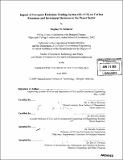Impact of European Emissions Trading System (EU-ETS) on carbon emissions and investment decisions in the power sector
Author(s)
Feilhauer, Stephan M. (Stephan Marvin)
DownloadFull printable version (61.43Mb)
Other Contributors
Massachusetts Institute of Technology. Dept. of Civil and Environmental Engineering.
Advisor
A. Denny Ellerman and David H. Marks.
Terms of use
Metadata
Show full item recordAbstract
This masters thesis assesses the impact of a emissions trading on short-term carbon abatement and investment decisions in the power sector. Environmental benefits from carbon abatement due to emissions trading are quantified using top-down trend analysis and a bottom-up power sector model "E-simulate" to define upper and lower boundaries on carbon abatement in Germany in the first phase of the EU Emissions Trading Scheme (2005-2007). The long-term economic and investment implications of emissions trading form the centerpiece of the thesis. A sample coal and gas investment project is modeled using discounted cash flows and analyzed using probabilistic Monte Carlo methods. The model results help explain the empirical evidence of an increase in coal investments in Germany against a preference for gas in the wider European market. The model is used to separately discuss both the price and allocation effects of emissions trading on investment decisions in the power sector. The modeling provides evidence of the dominance of fuel prices on the long-term investment decision and highlights under which carbon and fuel price scenarios the current preference for coal over gas investments could be reversed. Model results show a good match when compared to power spreads which are created using empirical data. Furthermore, related policy domains such as the Clean Development Mechanism (CDM) and Renewable energy policy are assessed and sector-wide carbon abatement estimates are reconciled between fuel switching and emissions displacement from renewables.
Description
Thesis (S.M. in Technology and Policy)--Massachusetts Institute of Technology, Engineering Systems Division, Technology and Policy Program; and, (S.M.)--Massachusetts Institute of Technology, Dept. of Civil and Environmental Engineering, 2009. Includes bibliographical references (p. 110-118).
Date issued
2009Department
Massachusetts Institute of Technology. Department of Civil and Environmental Engineering; Massachusetts Institute of Technology. Engineering Systems Division; Technology and Policy ProgramPublisher
Massachusetts Institute of Technology
Keywords
Engineering Systems Division., Technology and Policy Program., Civil and Environmental Engineering.